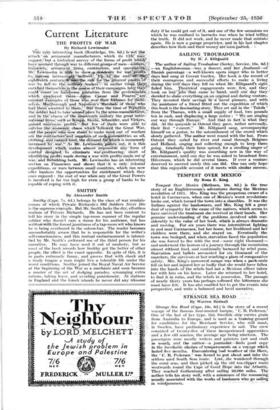SMITHY By Alexander Smith
Smithy (Cape, 7s. 6d.) belongs to the class of war reminis- cences of which PKiiyate Richards`s Old Soldiers Never Die is the supreme example. But Mr. Smith lacks the dry, effortless realism of Private Richards. He has not been content to tell his story in the simple tap-room manner of the regular soldier who doesn't care a damn for his audience, but has writiteli4ith the forced jauntiness of a tap-roorrrwit who knows lie is being overheard in the saloon-bar. The reader becomes uncomfortably. aware, that he. is responsible for the writer's self-consciousness, and this mutual embarrassment is intensi- fied by Mr. Smith's awkward use of the third person for his narrative. He may have used it out of modesty, but as most of the book records how Smithy got the better of other people, the effect is the exact opposite. In spite of this, it is in parts extremely funny, and proves that with cheek and a ready tongue a man might live a tolerable life under the ae tr ivoi sc Service wraotrsiotnscontadkitinio gnsl.eaNS.en:itahnyd joined avoiding iant ghine punishment.e eI Royal Na na sad soon 0 itnr stations at the beginning of the Wia:rvi
a master of the art of dodging parades, scrounging extra in England and the Greek islands he never did any irksome
duty if he could get out of it, and one of the few occasions on- which he was confined to barracks was when he tried telling the truth. It did not work, and he never made that mistake again. He now a garage proprietor, and in his last chapter describes how fools and their money atesoonspaRed. •


















































 Previous page
Previous page